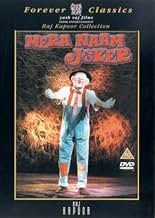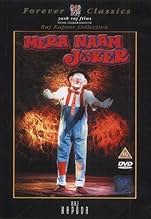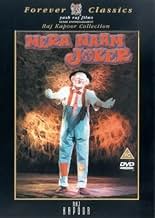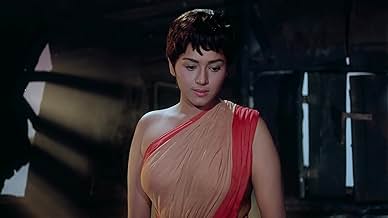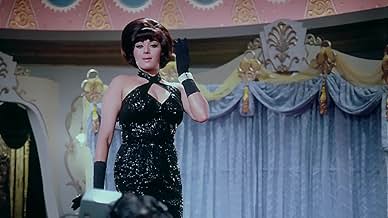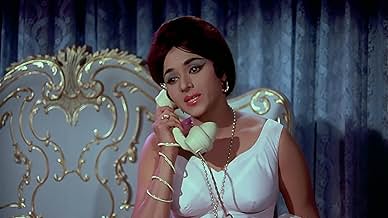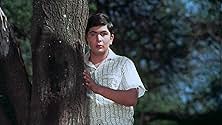Mera Naam Joker
- 1970
- 3h 44m
IMDb RATING
7.9/10
5.7K
YOUR RATING
A clown masks his pain while bringing joy to others. Through three life chapters marked by different relationships, Raju navigates love, loss, and purpose, reflecting universal emotional exp... Read allA clown masks his pain while bringing joy to others. Through three life chapters marked by different relationships, Raju navigates love, loss, and purpose, reflecting universal emotional experiences.A clown masks his pain while bringing joy to others. Through three life chapters marked by different relationships, Raju navigates love, loss, and purpose, reflecting universal emotional experiences.
- Awards
- 11 wins total
Achala Sachdev
- Raju's Mother
- (as Achla Sachdev)
Dharmendra
- Mahender Kumar
- (as Dharmender)
Dara Singh Randhawa
- Sher Singh
- (as Dara Singh)
Eduard Sjereda
- Member of the Soviet State Circus
- (as Edward Sereda)
Kseniya Ryabinkina
- Marina
- (as Miss Ksiena Rabiankina of the Bolshoi Ballet, Moscow)
Rajendra Kumar Tuli
- Mahender Kumar
- (as Rajender Kumar)
Rajendranath Malhotra
- Circus Surgeon
- (as Rajendra Nath)
Featured reviews
One of the greatest films ever made in India.No film has ever evoked my heart to such an extent and it's philosophy is outstanding.THe musical theme is magnificent and the songs remarkable.The story of a clown making the world laugh while secretly brushing that tear from his eye is like re-writing the life of Charlie Chaplin in the Indian form.The symbol of the joker however is over repeated after the first part which partly created a monotony for viewers.
I can never forger the scene when he smiles with a tear in his eyes after removing his glasses telling Russian actress Marina in the Circus that he is not sad.It is an absolutely heart touching film unsurpassed in the annals of Indian film history.
By Harsh Thakor
I can never forger the scene when he smiles with a tear in his eyes after removing his glasses telling Russian actress Marina in the Circus that he is not sad.It is an absolutely heart touching film unsurpassed in the annals of Indian film history.
By Harsh Thakor
I first saw this movie when it was first released in the cinemas in 1970. The movie shows the life of a clown, who has gone through many ups and downs in his life. As a child he is infatuated by his teacher, Mary but due to being poor he has to try and help his mother by acting like a clown. He finds out that his father was a clown in circus and that he is killed in an accident. He is finally expelled from school despite objections from the teacher. On his departure, he is informed that the teacher is leaving and is getting married and that her fiancé wants him to be his best man. At the same time, he is handed back a doll of a clown, which he had once given to his teacher. The next part is when he grows up and meets some Russian circus artists and decides to try and join them. During this time he falls in love with a female trapeze artist and despite language barrier he dreams of marrying her. but soon his mother, on finding out his real job, dies during one of his performances and he decides that life has to go on. But the circus closes and the artists return. Once again, he is handed the doll back The third and the final part is where he meets a dancer, Meena, who has to dress up as a boy in order survive. They fall in love and do many shows during which time, he informs her that he hates liers and leaves her for a while. Upon his return he gives her his doll. But soon this is returned when Meena finally finds a man with whom she thinks she will find fame with. The movie has a multistarcast, including Raj Kapoor himself. It is also partly based on his life. The music is provided superbly by Shankar Jaikeshen and the songs are meaningful and with emotions and are sung by the late Mukesh. Even after all these years, when I listen to the songs, I still find them full emotions but still fresh as ever and especially:"Jeena Hana Marna Hana" and Jane Kahan Gaye Woh Din." They say that Mukesh was Raj Kapoor's voice on the screen and this movies proves it. On the whole this is one movie that is worth to watch.
Raj Kapoor presents an hypothetical autobiography of scathing power that might be his most uncompromising movie and true legacy. Rishi Kapoor plays the young Raj very convincingly and I found the first part to be the most refreshing and touching. The Joker's philosophy is true but does not have may buyers but use this movie as a grand scale memento mori. Check out Raj Kapoor's 'Jagte Raho' for a more devastating social critique. The film is unique for a true Indo-Russian love story and dialogue in Russian. Love and let live.
I can't imagine another director who was as in control of his craft as Raj Kapoor was. Mera Naam Joker is an example of superb cinema. You can like or dislike it but people who appreciate cinematic quality will not deny the heart, soul, technique, and the artistic intensity with which it was made. Now, this film is not easy viewing, it is very entertaining, but it requires patience and it is perhaps one of the saddest films one can say. It's not just about particular scenes, it is the melancholy that Kapoor infuses it with. The film is the story of Raju, a famous clown who arrives on stage to give the last performance of his career. His invitees include all his past love interests, each representing a story of either heartbreak or unrequited love, or both, and three main flashbacks presented in three chapters proceed.
Mera Naam Joker could be described as slice-of-life cinema, given how real and detailed an account it is of one man's life, but if taken literally this would be an understatement, because it's a whole lifetime that is recounted in this picture. I'm not sure why Kapoor chose to make this film so sad in story and execution, and I often wonder if it was the outcome rather than his intention. Mera Naam Joker, of course, like many other films by Kapor, has moments of comedy, many such moments actually, but even beneath all of them, there's a deeply poignant foundation. Ironically, among the toughest and most heartbreaking scenes take place within the circus and even during a seemingly funny performance on stage. Some of these scenes are so poignant they really are tough to go through.
The film's first chapter is one of the most beautiful, sensitive portrayals of teenage life, puberty, and first love ever portrayed on screen. The character of Raju, that clumsy but lovable young adult, who has a heart of gold and a vulnerable soul, is a perfect reflection of the older clown. The way his teenage days are depicted, including his falling in love with his teacher Mary, his sexual fantasies, innocence, feelings of guilt, and romantic realisation, are just extraordinary. Rishi Kapoor is absolutely outstanding in this film, in one of the most natural, amazingly raw and unaffected performances one can imagine by a young man his age. His love interest Simi Garewal is wonderful as his caring teacher, and it's easy to see how this teenager fell in love with her given both her physical appearance and the cordial warmth she exudes.
The second chapter, set within a circus where a group of Russian entertainers arrive, is fascinating. First, being a bilingual episode, it is very rare, but the cultural and linguistic contact between the Indian and the Russian group is stupendous. This is where our protagonist meets the beautiful trapezist Marina, and their relationship is so beautifully portrayed and ends on such a touching, heart-wrenching note. Kseniya Ryabinkina is beautiful and radiant and plays really well opposite Kapoor. The third chapter, while clearly not as good as the first two, is also very interesting, but concludes on the most annoying note in relation to the characters' moral stand and Raju's attitude of accepting injustice and moving on. Padmini, the talented actress who was an extraordinary dancer, is fantastic in her part as the young woman pretending to be a man.
It would be fair to say Kapoor was the one filmmaker of Hindi cinema who had this incredible ability to exploit the raw sexuality of his heroines, sometimes by doing so little and without ever making them look vulgar or cheap. Few scenes could compare to the moment Simi Garewal steps out of the river she fell into and the right tip of her dress reveals her leg, the proceeding scene where she is seen undressing in the bushes, or her nude shot in young Raju's fantasies, which is shot brilliantly. The same can be said about the aesthetic brilliance with which Kseniya Ryabinkina is shot, and the moment Padmini reveals her identity as a woman and wears her sari is a scene of extraordinary artistic merit. The women in this film by Kapoor are the epitome of feminine beauty, each in her own way, and much of how well their beauty was captured is to Kapoor's credit.
Under his own extraordinary direction, Raj Kapoor, the actor, shines through. He employs most of his regular gestures and mannerisms, his well-known flamboyance and innocence, but just like with his circus persona, what lies beneath the surface of this amusingly eccentric man is a truly authentic, heartbreaking and compassionate performance of a man who spent his life wanting to make others laugh and never quite got his due. Other than Rishi Kapoor and the extraordinary leading ladies, Rajendra Kumar is there, Dharmendra and Dara Singh make nice appearances, although the best are Achala Sachdev as Raju's mother who fears most that her son would be a clown like his father, and particularly Manoj Kumar, the teacher's cool fiancé who immediately recognises Raju's feelings for his wife and accepts it with full understanding.
The film's narrative style and high production values are never less than excellent. The cinematography is excellent, and the background score keeps tugging at the heartstrings as it enhances the situations and gives life to an otherwise difficult story. The music by Shakar-Jaikishen is a classic of Indian cinema. "Ae Bhai Zara Dekh Ke Chalo", "Kehta Hai Joker Sara Zamana", "Ang Lag Jaa Balma", are all melodious, beautiful numbers brilliantly and soulfully sung by Manna Dey, Mukesh, and Asha Bhosle, respectively. The film's trademark number, of course, is Mukesh's poignant rendition of "Jeena Yahan Marna Yahan". This song pretty much sums up what Mera Naam Joker is, the sad story of a funny clown, a difficult film to watch but an ultimately rewarding experience. This film is a true example of the craftsmanship of Raj Kapoor, a true showman of Indian cinema who reinforced time and again the high quality present in mainstream films.
Mera Naam Joker could be described as slice-of-life cinema, given how real and detailed an account it is of one man's life, but if taken literally this would be an understatement, because it's a whole lifetime that is recounted in this picture. I'm not sure why Kapoor chose to make this film so sad in story and execution, and I often wonder if it was the outcome rather than his intention. Mera Naam Joker, of course, like many other films by Kapor, has moments of comedy, many such moments actually, but even beneath all of them, there's a deeply poignant foundation. Ironically, among the toughest and most heartbreaking scenes take place within the circus and even during a seemingly funny performance on stage. Some of these scenes are so poignant they really are tough to go through.
The film's first chapter is one of the most beautiful, sensitive portrayals of teenage life, puberty, and first love ever portrayed on screen. The character of Raju, that clumsy but lovable young adult, who has a heart of gold and a vulnerable soul, is a perfect reflection of the older clown. The way his teenage days are depicted, including his falling in love with his teacher Mary, his sexual fantasies, innocence, feelings of guilt, and romantic realisation, are just extraordinary. Rishi Kapoor is absolutely outstanding in this film, in one of the most natural, amazingly raw and unaffected performances one can imagine by a young man his age. His love interest Simi Garewal is wonderful as his caring teacher, and it's easy to see how this teenager fell in love with her given both her physical appearance and the cordial warmth she exudes.
The second chapter, set within a circus where a group of Russian entertainers arrive, is fascinating. First, being a bilingual episode, it is very rare, but the cultural and linguistic contact between the Indian and the Russian group is stupendous. This is where our protagonist meets the beautiful trapezist Marina, and their relationship is so beautifully portrayed and ends on such a touching, heart-wrenching note. Kseniya Ryabinkina is beautiful and radiant and plays really well opposite Kapoor. The third chapter, while clearly not as good as the first two, is also very interesting, but concludes on the most annoying note in relation to the characters' moral stand and Raju's attitude of accepting injustice and moving on. Padmini, the talented actress who was an extraordinary dancer, is fantastic in her part as the young woman pretending to be a man.
It would be fair to say Kapoor was the one filmmaker of Hindi cinema who had this incredible ability to exploit the raw sexuality of his heroines, sometimes by doing so little and without ever making them look vulgar or cheap. Few scenes could compare to the moment Simi Garewal steps out of the river she fell into and the right tip of her dress reveals her leg, the proceeding scene where she is seen undressing in the bushes, or her nude shot in young Raju's fantasies, which is shot brilliantly. The same can be said about the aesthetic brilliance with which Kseniya Ryabinkina is shot, and the moment Padmini reveals her identity as a woman and wears her sari is a scene of extraordinary artistic merit. The women in this film by Kapoor are the epitome of feminine beauty, each in her own way, and much of how well their beauty was captured is to Kapoor's credit.
Under his own extraordinary direction, Raj Kapoor, the actor, shines through. He employs most of his regular gestures and mannerisms, his well-known flamboyance and innocence, but just like with his circus persona, what lies beneath the surface of this amusingly eccentric man is a truly authentic, heartbreaking and compassionate performance of a man who spent his life wanting to make others laugh and never quite got his due. Other than Rishi Kapoor and the extraordinary leading ladies, Rajendra Kumar is there, Dharmendra and Dara Singh make nice appearances, although the best are Achala Sachdev as Raju's mother who fears most that her son would be a clown like his father, and particularly Manoj Kumar, the teacher's cool fiancé who immediately recognises Raju's feelings for his wife and accepts it with full understanding.
The film's narrative style and high production values are never less than excellent. The cinematography is excellent, and the background score keeps tugging at the heartstrings as it enhances the situations and gives life to an otherwise difficult story. The music by Shakar-Jaikishen is a classic of Indian cinema. "Ae Bhai Zara Dekh Ke Chalo", "Kehta Hai Joker Sara Zamana", "Ang Lag Jaa Balma", are all melodious, beautiful numbers brilliantly and soulfully sung by Manna Dey, Mukesh, and Asha Bhosle, respectively. The film's trademark number, of course, is Mukesh's poignant rendition of "Jeena Yahan Marna Yahan". This song pretty much sums up what Mera Naam Joker is, the sad story of a funny clown, a difficult film to watch but an ultimately rewarding experience. This film is a true example of the craftsmanship of Raj Kapoor, a true showman of Indian cinema who reinforced time and again the high quality present in mainstream films.
I will not repeat the same thing which is already covered by others. Mera Naam Joker I would say Raj Kapoor's one of the finest work in his career. A series followed after Awara, Sree 420, and Jagte Raho. Infect in true senses he expressed his real tribute to himself, his career. Whatever he learned he put everything into this. The philosophy says "the show must go on" who knows more than an actor. So whether he is happy or sad or crying he should always look happy and never show traces of his personal anguish. Personally Raj Kapoor was inspired by Charley Chaplin's work and we get the glimpse in his early movies. His philosophy behind this movie is true and very natural. Lets discuss different stages one by one.
Episode I
Adolescent infatuation, his thoughts, his dreams are true and I must say everyone must have faced the same situation with his teacher when in school. His point here only depicts how a young developing mind fantasies. His gesture to present his idol joker to his teacher is a very philosophical thought that only a director like Raj Kapoor can think. He repeats the same with other two women and gets it back all the time.
Episode II
This version depicts the young and passionate love of joker Raju. He tried to show a person in this age group does not think anything other than love, he thinks for romance and fantasies. Here too joker loves, dreams and shows his innocent heart. Raj Kapoor gave his life's best performance as a young joker.
Episode III
I would say this part was the only reason for the movie's failure. People at that time were not used to see mature love story. It was the time when they were used to see Shammi Kapoor's kind of love stories with young and sweet actresses. Padmini's appearance in the last episode makes the movie relatively dull as she was not a very talented actress rather a great dancer. She was never successful in her career in Hindi movies. However Raj Kapoor acted very well in as mature joker. His philosophy extends in this one. As he shows every one is a joker in his life. Life is a stage and everyone needs to perform his part and continue with his journey.
The symbol joker was returned to him thrice as if his heart was given back. His last duologue touches the most when his says his play will not stop here this is just an interval , which may be for 15 min,15 hours or 15 months so please don't go away . He said whatever he wanted to convey from this movie . He tried to prove that from this movie joker's next phase starts and surely after that he never acted in his movies as a hero. He chose his next episode where joker was directing other jokers for his show. Certainly it is his autobiographical work. At last I must say no one can replace a director like Raj Kapoor.
Episode I
Adolescent infatuation, his thoughts, his dreams are true and I must say everyone must have faced the same situation with his teacher when in school. His point here only depicts how a young developing mind fantasies. His gesture to present his idol joker to his teacher is a very philosophical thought that only a director like Raj Kapoor can think. He repeats the same with other two women and gets it back all the time.
Episode II
This version depicts the young and passionate love of joker Raju. He tried to show a person in this age group does not think anything other than love, he thinks for romance and fantasies. Here too joker loves, dreams and shows his innocent heart. Raj Kapoor gave his life's best performance as a young joker.
Episode III
I would say this part was the only reason for the movie's failure. People at that time were not used to see mature love story. It was the time when they were used to see Shammi Kapoor's kind of love stories with young and sweet actresses. Padmini's appearance in the last episode makes the movie relatively dull as she was not a very talented actress rather a great dancer. She was never successful in her career in Hindi movies. However Raj Kapoor acted very well in as mature joker. His philosophy extends in this one. As he shows every one is a joker in his life. Life is a stage and everyone needs to perform his part and continue with his journey.
The symbol joker was returned to him thrice as if his heart was given back. His last duologue touches the most when his says his play will not stop here this is just an interval , which may be for 15 min,15 hours or 15 months so please don't go away . He said whatever he wanted to convey from this movie . He tried to prove that from this movie joker's next phase starts and surely after that he never acted in his movies as a hero. He chose his next episode where joker was directing other jokers for his show. Certainly it is his autobiographical work. At last I must say no one can replace a director like Raj Kapoor.
Did you know
- TriviaRaj Kapoor put in his own money in the film also mortgaged his house, The film took 6 years to complete and was a big loss.
- Quotes
Raj 'Raju' Ranbir: In this world, the only things more dangerous and scary than a tiger are poverty and hunger.
- Crazy creditsat the end of the cast list.........: ".......with a cast of thousands"
- ConnectionsReferenced in Swarg (1990)
- SoundtracksJeena Yahaan Marna Yahaan Iske Siva Jaana Kahaan
Lyrics by Shailendra
Music by Shankarsingh Raghuwanshi and Jaikishan Dayabhai Panchal (as Shankar-Jaikishan)
Sung by Mukesh
- How long is Mera Naam Joker?Powered by Alexa
Details
- Release date
- Country of origin
- Language
- Also known as
- My Name Is Joker
- Filming locations
- Production company
- See more company credits at IMDbPro
- Runtime3 hours 44 minutes
- Color
- Aspect ratio
- 1.44 : 1
Contribute to this page
Suggest an edit or add missing content


